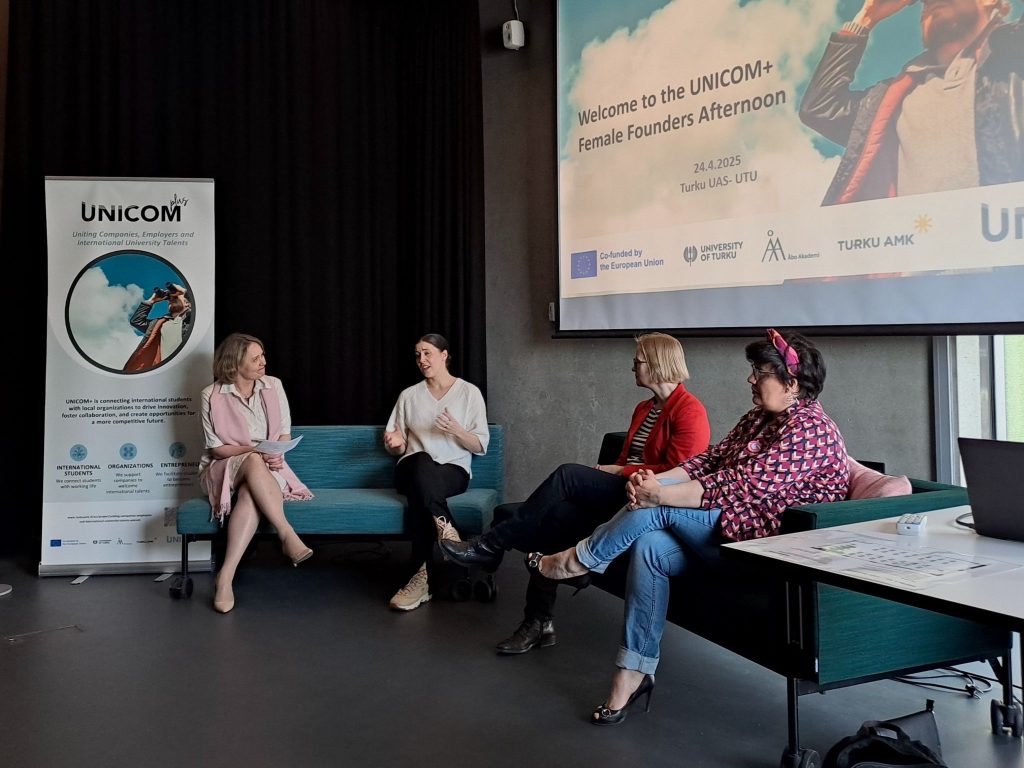Elämme selfieiden aikaa, jossa jokainen haluaa nähdä ja näyttää itsensä parhaasta mahdollisesta kuvakulmasta. Valokuvien kautta meillä on kuitenkin mahdollisuus paljon…
Tekijät | Authors

More women in entrepreneurship – inspiration and encouragement through role models
Statistics show that globally female entrepreneurs are underrepresented in the total population of entrepreneurs. The same applies for Finland, one of the most equal countries in the world. To empower more female founders, it is important to understand the underlying factors why women are less likely to start a business. More visibility for female founders is important since role models are a powerful source of inspiration and encouragement.
Finland is one of the most equal countries in the world when it comes to gender equality. However, statistics (Tilastokeskus 2025) show that in Finland most entrepreneurs are men, with only a third of entrepreneurs being female and only 20% of employer entrepreneurs are women. The difference is significant compared to the general workforce where the gender proportion is relatively equal; 48% of women and 52% of men.
Entrepreneurship tends to boost welfare and job creation in the society. The question is: Can we afford not to exploit the full potential of the other half of the population?
Entrepreneurship tends to boost welfare and job creation in the society
The past years have been particularly rough on women entrepreneurs. Women entrepreneurs tend to operate in low-margin industries (Yrittäjänaiset 2025), e.g. the service industries. The corona pandemic and the increase of prizes following Russia’s war on Ukraine took a significant toll on their businesses. The Finnish female entrepreneurs´ association reports that twice as many women than men closed their businesses in 2023 (Yrittäjänaiset 2025).
Furthermore, according to the Women in Entrepreneurship Score, Finland lags the top countries in the world, ranking 16 of 100 countries. The gender gap exists in business start-up intentions and has not narrowed in the twenty-first century in any age group (Saarela et al. 2024).
Key barriers for female entrepreneurs
According to Saarela et al. (2024) key barriers to female entrepreneurship in Finland include
- limited access to start-up capital
- lacking social capital
- challenges related to networking
Regarding limited access to start-up capital, there is evidence (eg . Edelman et al.2018) that female founders suffer from stereotypes in the investment discussions due to the bias of male angel investors when evaluating businesses. A mere 6% of the start-up funding is acquired by female founders (Yrittäjänaiset 2025).
Networks and mentorship are crucial for growth
The glass ceiling and the scarcity of female role models in high-level entrepreneurial roles do not foster female founders. Networks and mentorship are crucial in the success of female entrepreneurs providing support and resources for growth. However, women often struggle with gaining access to these networks of support.
How could we foster female entrepreneurship?
Bryant et al. (2012) discuss the underrepresented groups in entrepreneurship and propose a model consisting of social components and technical components, which are leading to likelihood to start a business and to business viability.
Social components such as access to role models and guidance and encouragement to entrepreneurship lead to entrepreneurial self-efficacy of female or other minority entrepreneurs which results in likelihood to start a business.
Technical components are related to knowledge base and training to develop business plans. The outcome is the viability of businesses.
Based on these dimensions, one could argue that we need both inspiring role models and encouragement as well as training.
Viewpoints from female founders
In a panel discussion organized as a part of UNICOM+ project three female founders with diverse backgrounds and ventures were invited to discuss and share their experiences with students. Their entrepreneurship storied differed significantly in the reasons why they became entrepreneurs and how they experienced entrepreneurship.
The experiences speak of several different reasons to become an entrepreneur. While some become entrepreneurs to live a life according to their own values, for example combining flexibility with maternity, others become entrepreneurs out of necessity, when employment is difficult and one needs a way to sustain oneself, or because one’s job is relocated.
Caregiving tends to rest on women’s shoulders. For women entrepreneurs combining caregiving with work can be cumbersome, the speakers had widely different views on this. On the one hand, if a support network is not in place, a female founder has an additional job in managing the household. When such network is in place, there seems to be little peer support for caregiving women entrepreneurs to share experiences with. On the other hand, if such networks are not available, much of running the household and managing the business can become.
Without support network female founders’ life can become extremely stressful
However, being a woman entrepreneur can also be a benefit as you stand out in the crowd of male startup founders and leave a memory trace with potential investors. This does, of course, not mean that gender bias, exclusion, and harassment are not contemporary issues. Rather, when one stands out in a crowd it can be useful when applying for funding in an otherwise homogenous group.
One of the aspects that were raised as a strong positive for entrepreneurship is that as an entrepreneur you learn more than when working in a corporate setting because you are not surrounded by specialized departments that can handle each case that falls outside your own scope. Instead, you yourself need to figure out everything from payroll to marketing.
The panelists represented very different entrepreneurship paths, illustrating that there is no one-size fits all model of entrepreneurship.
Despite the different starting points for the panelists, they all agreed that entrepreneurship is a rewarding career path and that more women should start their own businesses and dare to follow their ambitions.
References
Bryant, P. C., Fabian, F., Kinnamon, E., & Wright, P. (2012). Tailoring entrepreneurship education: Exploring components of entrepreneurship education for underrepresented groups. Journal of Business and Entrepreneurship, 23(2), 1-24.
Edelman, L. F., Donnelly, R., Manolova, T., & Brush, C. G. (2018). Gender stereotypes in the angel investment process. International Journal of Gender and Entrepreneurship, 10(2), 134-157.
Saarela, M., Björk, P., Kotavaara, O., Muhos, M., & Heikkinen, M. (2024). Gender Gap in Entrepreneurial Potential in Finland and Reflecting Its Underlying Causes.
Tilastokeskus. (2025). Tilastokeskus
Yrittäjänaiset. (2025). Naisyrittäjyys – Hukattu voimavara? Naisyrittäjyys – hukattu voimavara? – Yrittajanaiset.fi
Info Box
UNICOM+ (Uniting Companies, Employers and International University Talents (2025-2027)) is a consortium co-funded by the European Union ESF+ programme. Its goal is to support the employment and entrepreneurship paths of international students in the Turku region. The project works actively with Åbo Akademi, University of Turku, Turku City and the Centre for Economic Development, Transport and the Environment in Southwest Finland.
—
Artikkeli on osa Yrittäjyys ja arvonluonti -tutkimusryhmän julkaisuja.








